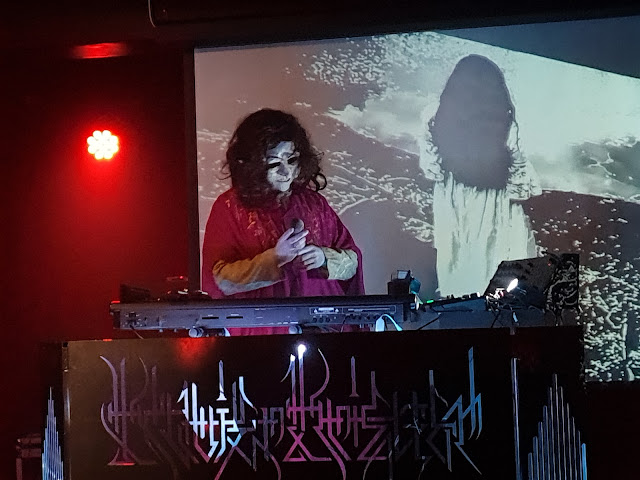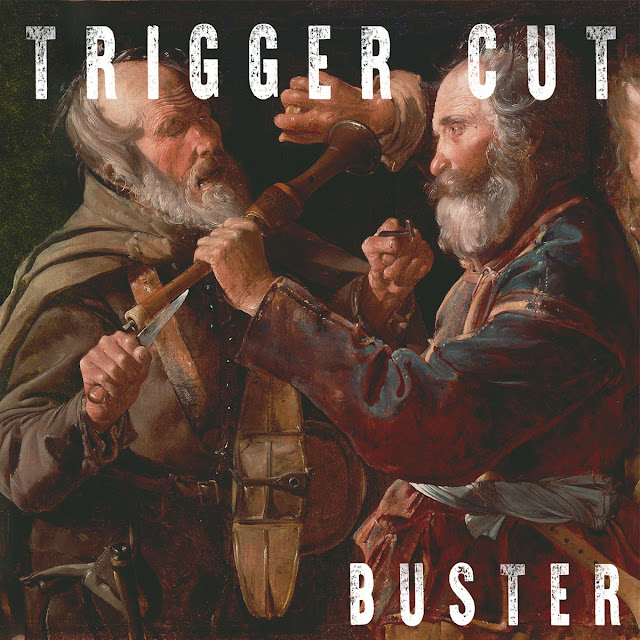ANOCHT-KLAVIER KRIEGER-STRIBORG AT ALTAR, 1/7/23
This concert provides rewarding insights
into the fruitful intermingling of genres that occurs on metal’s experimental
fringe. Anocht and Klavier Krieger, two artists from Melbourne, join Tasmanian underground
legend Striborg for a series of solo performances where the theatrics and bleak
themes of black metal meet dark ambient textures and mutant synth pop.
Anocht initiates proceedings with
strategies inherited from Blue Sabbath Black Cheer’s noise metal scene, layering
ear-splitting shards of feedback guitar over a low ominous pulse. His 30-minute
set is a feverish trail of amorphous themes that shares atmospherics with the
dank, tomb-scented exhalations of Gnaw Their Tongues and Abruptum. Tortured
vocalising over synth tritones and chitinous squeaks gives way to an even more
dour sequence of delay accumulated guitar riffs collapsing into a swirling fog
of distorted moans.
Klavier Krieger’s set begins with isolated, echo-drenched beats, opening space that will be gradually filled with a soundstorm suggesting Coil’s industrial occultism mixed with the expansive, abstract sonics of Lustmord and Deathprod. The artist appears in costume wearing a white mask and utilising a range of props to perform an obscure ritual over his keyboards and effects. A strobe light situated amongst his gear and trained directly on the performer triggers hallucinogenic suggestions: an eidetic memory of religious iconography mixed with flickering projection. The harlequin mask takes on the shrouded visage of the feeble, chairbound, self-mutilating deity from the opening scenes of E. Elias Merhige’s 1989 cult horror art movie Begotten. That film is a symbolic presentation through intentionally degraded black and white stock of deforming patterns of martyrdom and resurrection. There’s a touch of the abject in KK’s presentation, the senseless repetition of ritualised movements, that also recalls the pessimistic philosophy of Arthur Schopenhauer. The 19th century German’s thought has gained currency in black metal theory through writers like Eugene Thacker. It’s a world view that suits extreme metal’s representations of the hopeless inevitability of evil and despair. In his schema, human suffering results from striving prompted by an inescapable elemental force Schopenhauer calls the will-to-life. It’s a philosophy that’s also been influential in the weird fiction of Thomas Ligotti where the puppet is a dominant motif evoking existential terrors about the illusory nature of free will. Klavier Krieger’s theatrics are mysterious enough to admit a measure of ambiguity; the dark atmospheres his synths create allow the tentacular eldritch to encircle his audience.
Abjection is a significant element in Striborg’s oeuvre as well. His latest release, Through the Melancholy Tunnel of Despair, marks an electronica-tinted return to his 2000-2017 DSBM period after several years pursuing blackwave, his autogenous genre which dominates tonight’s set. Inspired by black metal groups like Darkthrone and Black Funeral, Russell Menzies began creating music for his Striborg solo project in the early 1990s. At one point, his music was released through the Southern Lord label, an association that led to the use of his stage name, Sin Nanna, as the title for the opening track on Sunn O)))’s Black One, one of experimental black metal’s supreme documents. His influences extend from classic psych and krautrock to the Australian 80s synth pop of his youth made by groups like Pseudoecho and Icehouse. That combination may sound atrocious in print depending on the personal tastes of others who grew up with such sounds emanating from commercial radio, but there’s not much evidence of any limitation in appeal judging by the reception blackwave receives from this youngish Hobart crowd.
Menzies is an artist aware of black metal’s restrictions as a genre and looking to rejuvenate his creative practice partly through repurposed nostalgia: the drizzly synths he prefers now to guitar suggest at times a black(ened vapor)wave. The shakier pop formalism of some songs in this set - mostly from last year's Lost in Between Worlds release - has its own aesthetic shortcomings, but it’s impossible to deny there’s an inspiring subliminal alchemy at work in blackwave at its most deconstructive: the darkwave lyricism of Lycia mixed into Chrome’s punk-psych future shock. Compare ‘As Life Fades Away’, the opening track of 2019’s An Existential Burden with ‘Driving in that Car (With the Eagle on the Hood)’, the final track from Royal Trux’s 1993 alt grunge-psych masterpiece Cats and Dogs. The combination of drum machine and distorted synths was a brief return from a pop orientation to experimental roots for the American duo; a different, more complicated trajectory was followed in Striborg’s case. Black metal intensity has been retained in lyrical themes, but aligned with music that is more unearthly than unholy, more estranged than excruciating, more (at its best) entrancing than extreme.
Schopenhauer argues that music’s
power for us arises from a two-fold paradox: it’s an embodiment of the
will-to-life, but its ability to suspend time allows the listener a brief diversion
from the will’s pernicious striving. With his age-defying corpse-painted B-Boy meets
Butoh moves, Menzies acts out a lifetime's sediment of influences and a confluence
of incongruities. He and the other artists in tonight’s show reveal the will to
life to be a double-edged sword: the genesis of our ceaseless travails, but also a
resource granting the blissful relief of art’s momentary escape routes.









Comments
Post a Comment